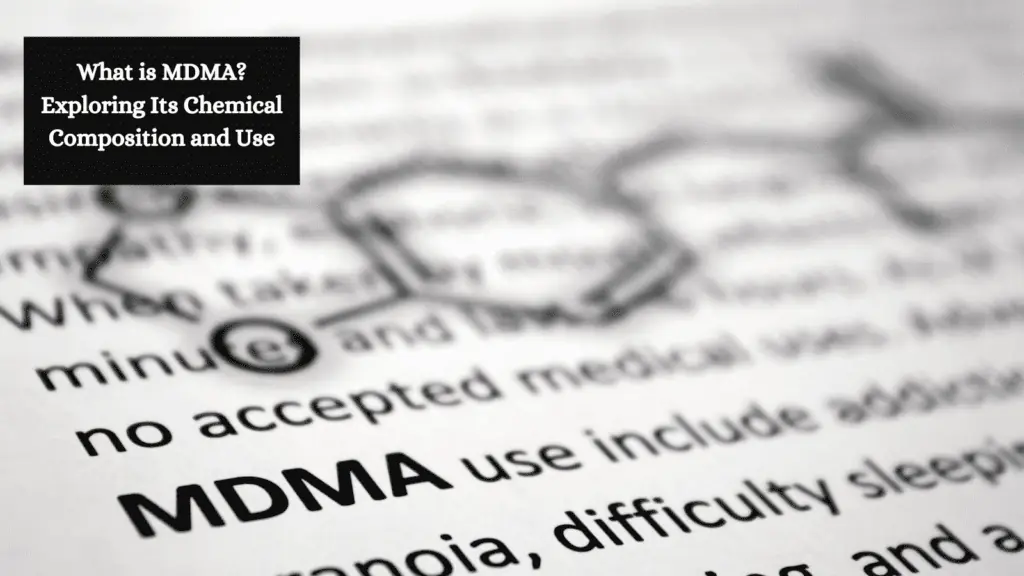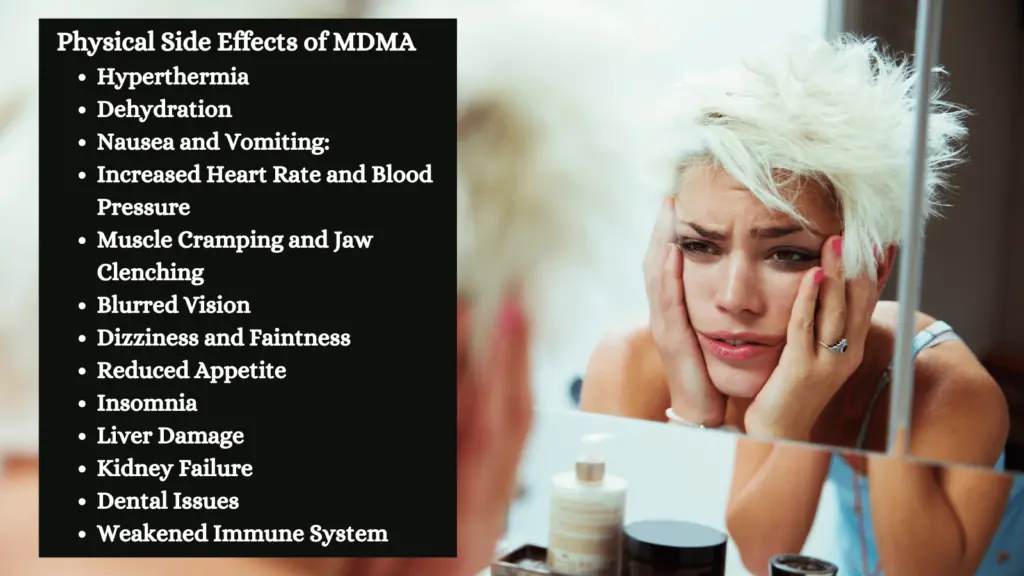MDMA, widely known as Ecstasy or Molly, stands as a prominent figure in today’s recreational drug landscape, captivating users with its promise of heightened emotions and energy. This synthetic substance, developed in the early 20th century, originally held potential for therapeutic applications but swiftly transitioned to recreational use due to its psychoactive properties. What draws attention, however, are the significant health risks and side effects accompanying its use.
Statistics reveal a concerning trend: according to the National Institute on Drug Abuse, about 1 in 10 people in the United States have used MDMA at least once in their life, underscoring its prevalence. Ecstasy’s chemical makeup and interaction with the human body have an extensive spectrum of side effects. A comprehensive understanding of MDMA (Ecstasy/Molly) is vital in order to grasp the implications of its use and the hidden costs behind the temporary euphoria it offers.

What Is MDMA? Exploring Its Chemical Composition and Use
MDMA, also known as ecstasy or molly, is a synthetic drug that combines stimulant and hallucinogenic properties. MDMA is primarily used for its euphoric effects, which include heightened sensory perception, emotional warmth, and a sense of well-being. These effects make it popular in social settings like parties and clubs, where users seek to enhance their social interactions and sensory experiences. However, its use carries significant risks, including neurotoxicity, cognitive impairments, and dangerous increases in heart rate and body temperature. The drug’s unregulated status often leads to impurities that heighten these risks, making its use particularly hazardous.
The Short-Term Effects of MDMA: What Happens During Use?
When MDMA, commonly known as Ecstasy or Molly, is used, its short-term effects typically begin within 30 to 45 minutes after ingestion and can last for several hours. Users often experience a surge in energy and heightened sensory perception, which includes an intensified experience of colors, sounds, and touch. Alongside this, MDMA induces feelings of emotional warmth, empathy, and a sense of well-being, which contribute to its popularity in social settings like clubs and parties.
However, these desirable effects are accompanied by several adverse reactions. Users might face dehydration, hyperthermia (elevated body temperature), and increased heart rate. Additionally, MDMA can cause anxiety, agitation, and severe mood swings during and after its use. The effects of MDMA typically start to wear off within 3 to 6 hours after ingestion. However, this duration can vary based on several factors including the dose taken, the purity of the drug, and the individual’s metabolism and body chemistry. After the primary effects diminish, users may experience after-effects or a ‘comedown’, which can last for several days, characterized by feelings of fatigue, sadness, or emotional depletion.
Long-Term Side Effects of MDMA
Long-term side effects of MDMA (Ecstasy/Molly) use pose significant risks and can have profound impacts on both physical and mental health. Chronic use of MDMA can lead to lasting brain changes, particularly affecting chemicals and receptors related to mood, thought, and memory. Users may experience long-standing cognitive issues, including problems with memory, attention, and decision-making.
Withdrawal from MDMA is another significant concern. Users often report experiencing confusion, irritability, anxiety, and sleep disturbances when trying to quit. These withdrawal symptoms, coupled with the drug’s impact on brain chemistry, can make recovery challenging and underscore the need for professional support in overcoming addiction to MDMA.
How Does Ecstasy Affect Mental Health?
Ecstasy, or MDMA, has a profound impact on mental health, with its effects closely intertwined with addiction and psychological well-being. The drug works by significantly increasing the release of neurotransmitters like serotonin, dopamine, and norepinephrine, which are responsible for mood regulation, energy levels, and feelings of happiness. This surge in neurotransmitters creates the characteristic ‘high’ of MDMA, marked by intense feelings of euphoria, emotional warmth, and a heightened sense of connection with others.
Neurological risks include the potential for developing serotonin syndrome, a dangerous condition resulting from excessive serotonin in the brain, and an increased risk of seizures. Additionally, prolonged MDMA use has been linked to increased rates of anxiety, depression, and other mood disorders. This is partly due to the depletion of serotonin caused by repeated use, which can lead to emotional instability and mood swings.
The cycle of addiction is further fueled by the need to avoid the negative mental states that follow the drug’s wear-off, such as feelings of sadness, irritability, and emptiness, known as the ‘comedown’ effect. As users consume more of the drug to escape these negative after-effects, the risk of developing a psychological dependency increases, creating a vicious cycle that intertwines addiction and mental health challenges.

Physical Side Effects of Ecstasy
The use of MDMA (Ecstasy/Molly) can lead to several specific physical side effects, which range from mild to severe, depending on the dosage, frequency of use, and individual physiology. Some of the notable physical side effects include:
- Hyperthermia (Overheating): MDMA can cause a dangerous rise in body temperature, which can lead to heatstroke.
- Dehydration: Users often experience dehydration, partly due to increased physical activity and sweating.
- Nausea and Vomiting: These are common, especially shortly after ingestion.
- Increased Heart Rate and Blood Pressure: MDMA can stimulate the heart, potentially dangerous for those with cardiovascular conditions.
- Muscle Cramping and Jaw Clenching (Bruxism): Users frequently report tension in the jaw and other muscles.
- Blurred Vision: This effect is often reported due to MDMA’s impact on neurotransmitter activity.
- Dizziness and Faintness: These can occur due to changes in blood pressure and dehydration.
- Reduced Appetite: MDMA can suppress hunger, impacting dietary habits.
- Insomnia: The stimulant properties of MDMA can make it difficult to sleep.
- Liver Damage: High doses or frequent use can lead to liver toxicity.
- Kidney Failure: Especially in cases of severe hyperthermia and dehydration.
- Dental Issues: Chronic users may suffer from dental erosion due to prolonged jaw clenching.
- Weakened Immune System: Evidence suggests MDMA use can impact immune system functioning.
These side effects can vary greatly from person to person and can be exacerbated when MDMA is combined with other substances, highlighting the risks associated with its use.
MDMA and Neurotoxicity: What Does the Research Say?
Research on MDMA and neurotoxicity has raised significant concerns about its potential long-term effects on the brain. Studies suggest that MDMA can cause neurotoxic damage, particularly to neurons that release serotonin, a key neurotransmitter involved in regulating mood, memory, and sleep, among other functions.
- Serotonin System Damage: Research indicates that MDMA can lead to long-lasting damage to serotonergic neurons. This damage may result in a reduction in serotonin levels and changes in the brain’s serotonin transport system.
- Cognitive Impairments: Some studies have shown that regular MDMA users can experience cognitive deficits, particularly in memory, executive function, and information processing.
- Mood Disorders: Given serotonin’s role in mood regulation, MDMA-induced damage to serotonergic neurons can be associated with an increased risk of depression and anxiety disorders.
- Brain Imaging Findings: Neuroimaging studies have revealed changes in the brain activity and structure of individuals who use MDMA regularly, supporting the hypothesis of its neurotoxic potential.
- Potential for Recovery: There is some evidence suggesting that certain neurotoxic effects of MDMA may be reversible after prolonged abstinence, but this recovery might not be complete for all users.
Is MDMA Addictive?
The question of whether MDMA (Ecstasy/Molly) is addictive is a complex one that delves into both the drug’s pharmacology and its psychological effects. Scientifically, MDMA’s potential for addiction is somewhat different from substances like opioids or nicotine, which have a high physical dependence potential.
- Psychological Dependency: The primary concern with MDMA is psychological dependence. Users may become reliant on the drug for socializing, enhancing mood, or coping with problems, due to the intense euphoria and feelings of emotional closeness it induces.
- Impact on Neurotransmitters: MDMA causes a massive release of serotonin, dopamine, and norepinephrine in the brain. This flood of neurotransmitters creates the drug’s mood-lifting and empathic effects. However, the brain’s reward system can be affected by these surges, leading to a desire to repeat the experience.
- Tolerance Development: Regular users of MDMA can develop a tolerance, requiring higher doses to achieve the same effects, which is a hallmark of addictive substances.
- Compulsive Use Patterns: Some individuals may develop patterns of compulsive use, continually seeking the drug despite understanding the risks and experiencing negative consequences, which is indicative of addiction.
- Neuro-chemical Recovery: After MDMA use, the brain undergoes a period of neuro-chemical imbalance, often resulting in low mood or ‘comedowns.’ This state can create a cycle where users consume more MDMA to alleviate these after-effects, contributing to addictive behavior.

How Can We Help – The Nestled
While MDMA may not lead to traditional physical dependency like some other drugs, its impact on brain chemistry and the potential for psychological dependency suggest it can be addictive for some users. The reliance on the drug for emotional or social enhancement and the risk of developing compulsive usage patterns are significant concerns of MDMA use.
If you or someone you know is struggling with MDMA addiction, remember that help and support are available. The Nestled Recovery offers specialized care and effective strategies to overcome addiction. Reach out to our compassionate team to explore a range of treatment options tailored to your needs. Contact The Nestled Recovery today to take the first step towards a healthier, substance-free life. Your journey to recovery and well-being starts with this crucial step.








